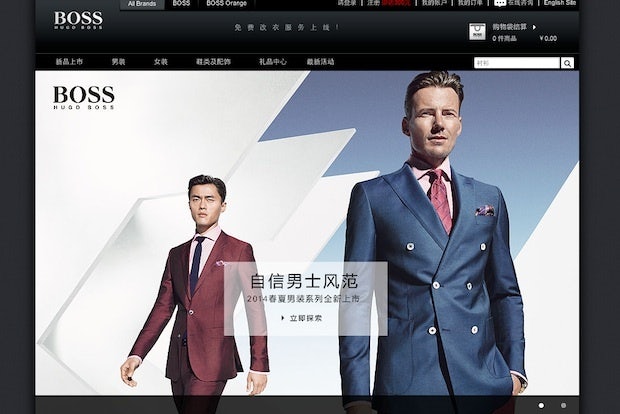
Hugo Boss' Chinese e-commerce site. (Hugo Boss)
Everyone knows that China’s e-commerce market has exploded in recent years, becoming the second largest in the world and hosting the world's single largest e-tail holiday every November 11. While this certainly has major implications for every retail sector, navigating the e-commerce market in China has been especially tricky for luxury brands, which have traditionally relied more heavily on in-store experience than other types of goods.
In order to shed some more light on what China’s e-commerce boom means for luxury, a new report by consulting firm KPMG in association with online flash sale site Glamour Sales and social community Mogujie surveyed 10,200 Chinese luxury e-commerce consumers on their motivations for purchase, preferred online shopping platforms, greatest concerns, and more.
According to the report, luxury brands are reluctant about delving heavily into Chinese e-commerce despite great potential in the market. “Only five of the top 60 brands operate their own online sites,” said Glamour Sales CEO Thibault Villet. “They have been late with their online strategy because they have focused on expanding their bricks and mortar network in China. Secondly, they did not anticipate how quickly Chinese consumers would shift to online purchasing.”
Below, we’ve listed five of the most useful and interesting facts featured in the report about the habits of China’s online luxury consumers.
They’re most motivated by price#
Just because online luxury shoppers are buying high-end goods, it doesn’t mean they think they’re splurging. In fact, a lower price was one reason 74 percent of respondents said they bought luxury online, and price was the most common product information sought online, with 79 percent of users searching for it (the importance of online searches for luxury prices was also found in a recent Baidu study). Meanwhile, the fact that it’s less time-consuming than brick-and-mortar came in second at 55 percent. Buying American and European brands came in next at just under 50 percent, and notably, “uniqueness” came in at 33 percent, showing the market potential for niche e-tailers.

Their biggest worry is still fakes, but they also just want to try things on#
The massive proliferation of fakes in China on not only Taobao, but also sometimes established e-commerce sites, means that authenticity is the top concern among consumers. This worries 78 percent of them, followed by the unavailability of typical brick-and-mortar amenities such as the option to try on products, find the right size, and see what they’re getting in person. This is actually good news for high-end luxury e-tailers, which, thanks to high price points, have the opportunity to offer special concierge services to allow couriers to wait for the client to try on the item. This extra effort is already being embraced by some luxury e-commerce sites, such as ShangPin.

They use multiple devices for online shopping#
“A key trend is the rise of mobile shopping; for us it is currently 22 percent of our sales (excluding tablets),” said Villet of Glamour Sales’ experience with mobile customers. Furthermore, he says that, “about 50 percent of our business is on non-PC platforms.” According to the report, more than 50 percent of consumers surveyed said they’d used a smartphone for luxury e-shopping, while more than 30 percent used a tablet. The rise of mobile shopping is also being driven more by Chinese women than by men—59 percent of women use smartphones for online purchasing, compared to 38 percent for men. The use of mobile devices is due in large part to Chinese consumers’ busy lifestyles, with 74 percent saying they use their smartphone for luxury shopping “on the go.”

Endorsements by those they trust are more important than those by celebrities#
When it comes to the most important place for learning about luxury products, social media reviews came in as the top information channel and were followed closely by friends’ recommendations and word-of-mouth. As you can see from the chart below, celebrities and key opinion leaders (KOLs) are also still important, but rank far below endorsements from consumers’ more trusted members of their network.

Their payment methods are rapidly evolving#
While cash-on-delivery (COD) used to be the most important payment methods for Chinese consumers, it has now been superseded by a plethora of new technologies. The most important of these is online payment systems, although credit card payments are also quickly becoming more important. Meanwhile, mobile payments are toward the bottom of the list now, but the landscape is always changing, and Villet predicts that WeChat’s new payment system will change that in 2014.
